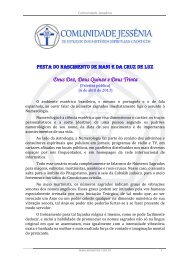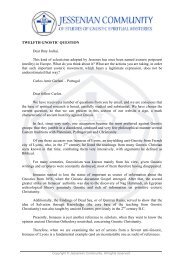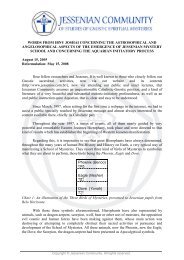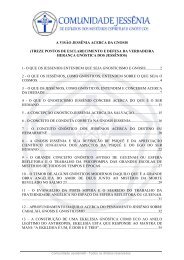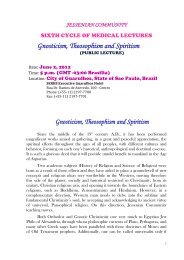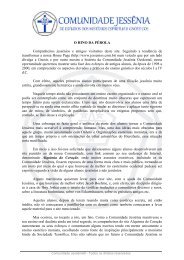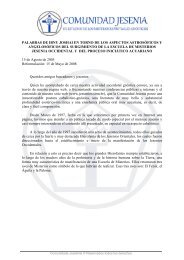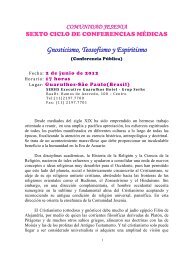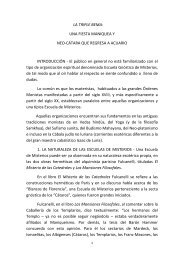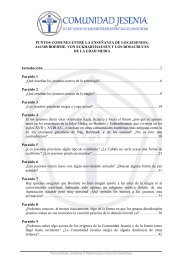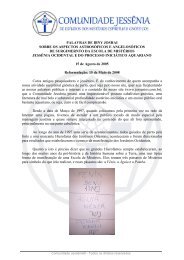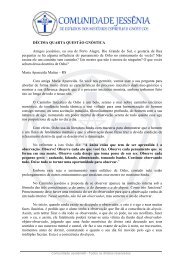JESSENIC VIEW ON GNOSIS (THIRTEEN POINTS OF ...
JESSENIC VIEW ON GNOSIS (THIRTEEN POINTS OF ...
JESSENIC VIEW ON GNOSIS (THIRTEEN POINTS OF ...
Create successful ePaper yourself
Turn your PDF publications into a flip-book with our unique Google optimized e-Paper software.
Jessenic View on Gnosis<br />
theologians and other thinkers influenced until today by the negative propaganda from the socalled<br />
heresiologists of Christian Roman and Orthodox Church.<br />
In fact, the academic acknowledge that Christian Gnosis has achieved to neatly define<br />
– in the point to call the attention of a genius like Jung – the human mind and psyche, a deed<br />
accomplished not even close by Roman and Orthodox Christians, is a hard blow to the Church<br />
and theologians, sociologists and thinkers linked and committed to it.<br />
Gnosticism has followed closely to Pythagoreanism, defining human mind as a subtle<br />
organism, composed of the faculties of thinking, willing, felling, rational memory, cognition,<br />
insight and enlightenment.<br />
Then, Gnosticism has attempted to define Soul or Psyche, connecting its nature to the<br />
blood and its seven impious metals subtly acting in it. Regarding this, Gnosticism was closely<br />
followed by Alchemy, a Medieval science that has represented in Europe a Gnostic current,<br />
granting an even greater scientific evaluation to its doctrinal contents.<br />
Eventually, Gnosticism has described the journey of that human Soul within the body<br />
with blood as narrative of torments or a drama with massive sorrow background to pervade<br />
the Soul and obscure all of its attempts to make itself conscious of its elevated ancestry and<br />
the need to get free from its bodily jail.<br />
In addition, this Soul journey through sorrows is the core motif of ancient esoteric<br />
currents of Phytagoreanism, Platonism, Essenism and Zoroastrianism, as well as, partly,<br />
Mysteries of Isis and Osiris, and Buddhism, which are embraced by Gnosticism for a truly<br />
esoteric-mythical reformulation.<br />
Gnosticism retells the legend of the regrettable diving of the Soul or Psyche into<br />
material world, building a grandiose myth relating the Soul to impious cosmic powers, to the<br />
Saviour figure, about a human incarnation of the Deity, his daily saga among us, humans,<br />
about the Cross, the Grave etc.<br />
Jung, in his book Answer to Job, says us, while capturing this function with which<br />
Gnosis endows the myth: ‘the day-by-day routine of Christ can be found interweaved in a<br />
certain way to the marvel and the mythical that it never can be distinguished what is real from<br />
what is not… regarding this, it was admitted that Christ would be a myth, that is to say he<br />
would be a fiction. The myth, however, is not a fiction; on the contrary, myth can be checked<br />
in events incessantly repeating and can be constantly observed. It takes place inside man, as<br />
men have a mythical fate, likewise Greek mythology heros.’<br />
Jung will take – in his alluded essay Answer to Job – that esoteric art of viewing as<br />
Gnostic-mythical the life of Christ, Jehovah and Job to the very high level of a cogitation<br />
entirely defining human Psyche and its ability to deal with fate (or Heimarmené) or its<br />
conception on God, by using Gnosticism as the foundation for his arguments or investigation<br />
tools.<br />
Gnosticism had been seeing in apocalyptical books a true manner or mythic literary<br />
language that had presented the actual condition of a mind and Psyche ready to understand<br />
God and engage in an enlightening relationship with Him. Furthermore, Jung has realized that<br />
24



